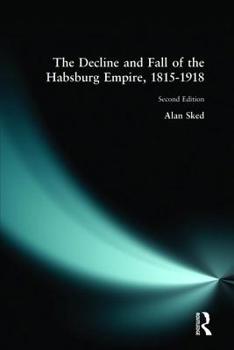The Decline and Fall of the Habsburg Empire, 1815-1918
Select Format
Select Condition 
Book Overview
A new and revised edition of Alan Sked's groundbreaking book which examines how the Habsburg Empire survived the revolutionary turmoil of 1848. 'The Year of Revolutions', saw the whole of Europe convulsed in turmoil and revolt. Yet the Habsburg Empire survived. As state after state succumbed to the violent winds of change that were sweeping the continent. How did the Habsburg Empire survive? How was the army able hold together...
Format:Paperback
Language:English
ISBN:0582356660
ISBN13:9780582356665
Release Date:July 2001
Publisher:Routledge
Length:364 Pages
Weight:1.20 lbs.
Dimensions:0.8" x 6.1" x 9.2"
Customer Reviews
3 ratings
A Misleading Title
Published by Thriftbooks.com User , 20 years ago
If the book has a theme, it is that the Dynasty and the Empire were not in irreversible decline and the fall, brought about by defeat in WWI, was not inevitable. Why the title then? Well, towards the end of the book, in a couple of chapters added to the second edition, Sked admits that the title was chosen by his publishers and not by him. My main reason for contributing this review is that I don't think it is clear from other reviews here that Sked's book is not a narrative or comprehensive history of the Habsburg Empire from the Congress of Vienna until its fall. It is rather a series of essays which reflect on other historians' treatment of some of the major themes in Habsburg historiography. These are interesting, challenging, occasionally repetitive, but are not, and do not pretend to be, a substitute for a general history of the period (such as C.A. Macartney's great work).
Woodrow Wilson's Crime Against Humanity Exposed
Published by Thriftbooks.com User , 22 years ago
What I am about to type concerning this book will be rather political, so I should make it clear at the outset that the author himself has no political axe to grind. He is simply examining and refuting some common misconceptions about the last century of the Habsburg Empire and the causes of it's fall. If that is what you are looking for, you could not do better than to read this book. This is *the best* book on the subject in English, bar none. If that is your interest, **buy it**, without reservation. Alan Sked's political opinions appear no where in it's pages, which are full of hard facts and strong historical thinking. It is in every way a model piece of historical scholarship. The reason I see this as a very political text is that the history of the fall of the Habsburgs has been put to ideological use for a long time now. The Habsburg Empire was dismembered by that crusading moralist professor, Woodrow Wilson, in the name of "Democracy", "Progress", and other "enlightened" ideals for which he was willing to kill and send others to die. It has been argued that the fall of the Habsburgs was a kind of bellwether, proving the inevitable progress of modernity and modern politics over the face of the whole Earth as a reactionary dionsaur of an empire finally died under the weight of it's own anachronism and decrepitude. The author of this book disproves that thesis totally. He demonstrates definitively that the Habsburg Empire was not weak or inept, and that in fact it faced it's worse crisis in 1848, and, having survived that, was viable as a political unit right up until the end of it's life. There was no mass longing for democracy, no mass discontent with the ancient Monarchy of the House of Habsburg, no demand for "national sovereignty" or "self-determination" on the part of the many nationalities of the Empire. They were fiercely loyal to the Monarchy right up until the end of it's existence. The Habsburgs fell, not because of the "turning of the tides of history" against them, but because they picked the wrong side in WWI. Period. The fact that this is so undermines most of the cherished myths of the modern West. It proves that history has no inevitable current ending up with us, since it shows that the way history turned out was in fact the result of the individual choices of men, rather than the effect of some kind of powerful underlying trend that men could not have shaped. It proves that democratic gov't's are not the only ones capable of being seen as legitimate in the eyes of their people and that a nation of highly cultured and relatively wealthy people (the Austrians) could happily and freely choose to live under a radically different form of gov't, namely a hereditary monarchy. It proves that a powerful multi-ethinc state can be built, if ethnicity is carefully divorced from political power and protected (the Empire of the Habsburgs was virutally a microcosm of Europe in it's vast ethnic diversity). It proves that religion can be
An invaluable text for students of the Habsburg Monarchy
Published by Thriftbooks.com User , 25 years ago
This text is truly invaluable for students of the Habsburg Monarchy. It's major strength has to be that it is analytical in style, providing explanations for the decline in fortunes of the Habsburg Monarchy. It is also innovative in that it provides a new perspective on the last century of Habsburg rule. Sked's book is an extremely readable text, which is accessible for all. An added bonus is that it provides a background to the historiography surrounding the Austrian Empire. Even if you do not agree with Sked's conclusions, it will certainly give you something new to think about, and is a useful antidote to the more traditional interpretaions of the Habsburg decline. I cannot recommend this book strongly enough!





